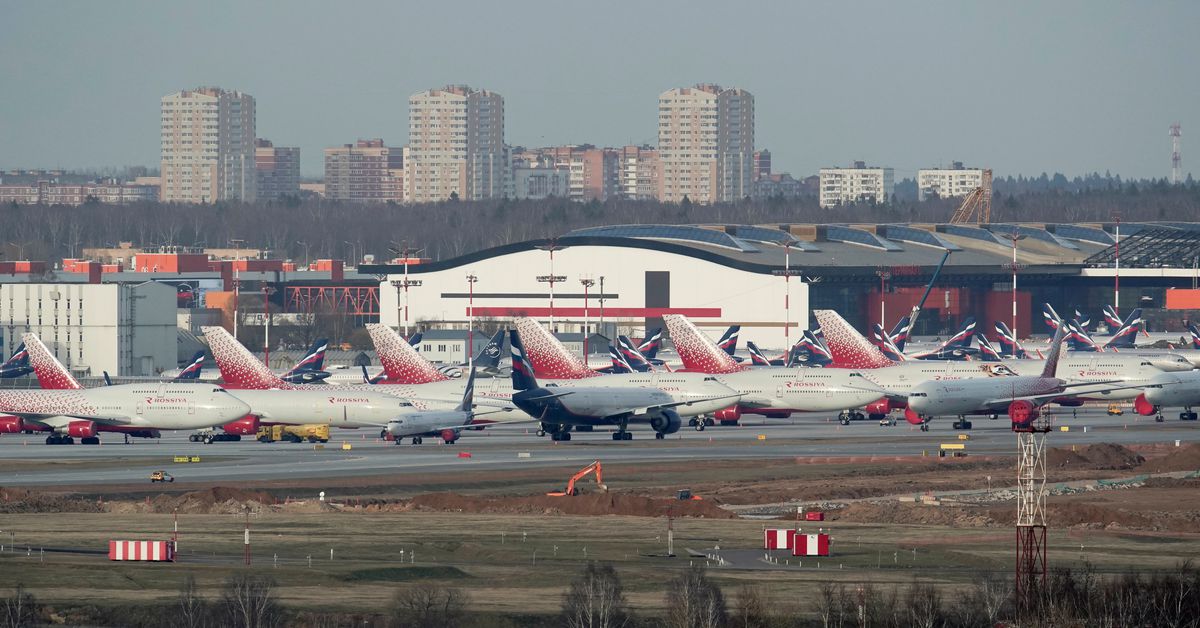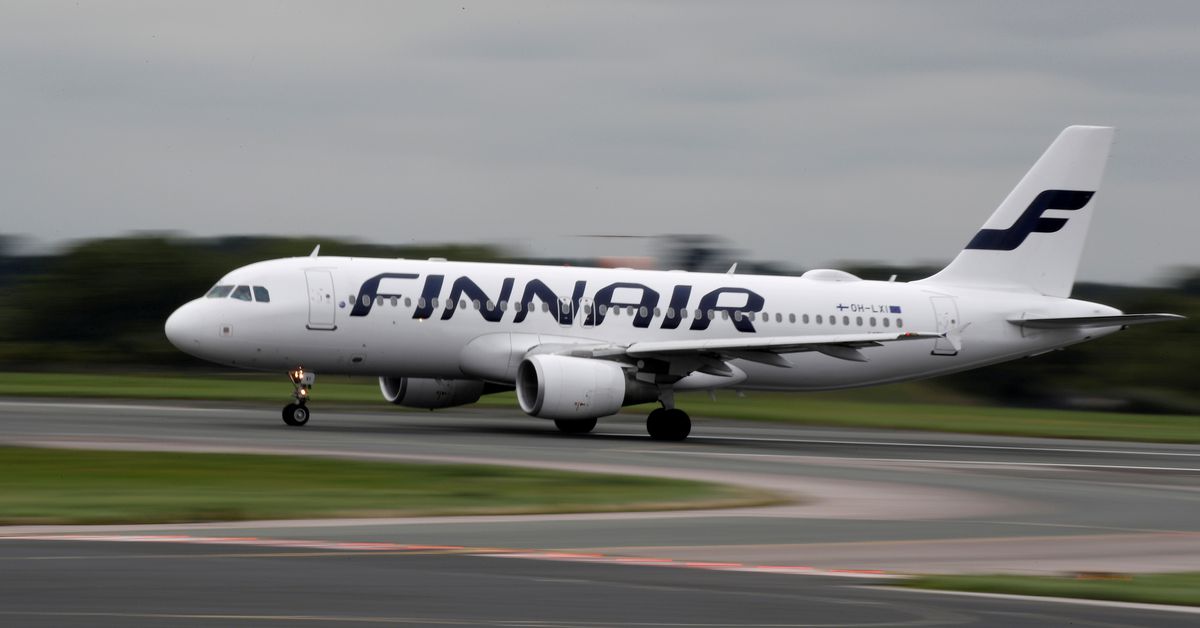Planes of Aeroflot and Rossiya Airlines are seen parked at Sheremetyevo International Airport, as the spread of the coronavirus disease (COVID-19) continues, outside Moscow, Russia April 8, 2020 REUTERS/Tatyana Makeyeva/File PhotoRegister now for FREE unlimited access to Reuters.comLONDON, May 30 (Reuters) – Insurance premiums are doubling or more for some aviation and marine business particularly exposed to the war in Ukraine, increasing costs for airline and shipping firms, industry sources say.Global commercial insurance premiums rose 11% on average in the first quarter, according to insurance broker Marsh, which said the war was putting upward pressure on rates.But the overall figure masks sharper moves in some sectors, and only covers the first five weeks following the invasion.Register now for FREE unlimited access to Reuters.comWar is typically excluded from mainstream insurance policies. Customers buy extra war cover on top.Garrett Hanrahan, global head of aviation at Marsh, said aviation war insurance was no longer available for Ukraine, Russia and Belarus as a result of the conflict.For the rest of the world, aviation war cover has doubled, as insurers try to recoup some of their losses, he said.”The hull war market is beginning to reflate itself through rate rises.”The conflict, which Russia calls a “special military operation”, could lead to insurance losses of $16 billion-$35 billion in so-called “specialty” insurance classes such as aviation, marine, trade credit, political risk and cyber, S&P Global said in a report. read more Aviation insurance claims alone could total $15 billion, S&P Global said, with hundreds of leased planes stranded in Russia as a result of western sanctions and Russian countermeasures.One aircraft lessor described recent rate increases on its insurance as “not a pretty sight”. read more Some aircraft lessors – a particularly exposed sector of the market because their planes are stuck in Russia – were now having to pay 10 times their original premium, one underwriter said, while another said insurers could “name their price” to lessors.In ship insurance, policyholders pay an additional “breach” premium when a ship enters particularly dangerous waters, locations which are updated by the Lloyd’s market.For the area around Russian and Ukrainian waters in the Black Sea and Sea of Avov, this has increased multiple times, three insurance sources said, to around 5% of the value of the ship, from 0.025% before the invasion, amounting to millions of dollars for a seven-day policy.Each time a ship goes into those waters, it has to pay that extra premium.Rates for ships going into other Russian waters have also risen by at least 50% after the Lloyd’s market classified all Russian ports as high risk, two of the sources said.Because of the dangers, some marine insurers have also stopped providing cover for the region. read more Register now for FREE unlimited access to Reuters.comReporting by Carolyn Cohn, Jonathan Saul and Noor Zainab Hussain, Editing by Angus MacSwanOur Standards: The Thomson Reuters Trust Principles. .
In it for the long haul: Qantas bets on non-stop Sydney-London flights with Airbus order
- Orders 12 Airbus ultra-long haul A350-1000 planes
- Commercial direct Sydney-London flight to start late in 2025
- 20-hour trip to be world’s longest non-stop flight
- Orders 20 A321XLRs and 20 A220s to renew domestic fleet
- Overall Airbus deal could be worth more than $4 bln – Barrenjoey
SYDNEY, May 2 (Reuters) – Qantas Airways (QAN.AX) will fly non-stop from Sydney to London after ordering a dozen special Airbus (AIR.PA) jets, charging higher fares in a multi-billion dollar bet that fliers will pay a premium to save four hours on the popular route.To be launched late in 2025, the flights will use A350-1000 planes, specially configured with extra premium seating and reduced overall capacity, to ferry up to 238 passengers in a 20-hour trip – the world’s longest direct commercial flight.Announcing plans for the service on Monday, the loss-making carrier said a strong recovery in the domestic market and signs of an improvement in international flying after the worst of the COVID-19 pandemic had given it the confidence to make a major investment on its future. Qantas forecasts a return to profit in the financial year starting this July.Register now for FREE unlimited access to Reuters.comThe order from the European aircraft maker also includes 40 narrowbody A321XLR and A220 jets to start the replacement of Qantas’ ageing domestic fleet, with deliveries spread over a decade. The airline did not disclose the value of the Airbus deal, but analysts at Barrenjoey estimated in a client note it would cost at least A$6 billion ($4.23 billion).”Since the start of the calendar year, we have seen huge increases in demand,” Qantas Chief Executive Alan Joyce told reporters at Sydney Airport, where an Airbus A350-1000 test plane flown from France emblazoned with the Qantas logo and “Our Spirit flies further” was parked in a hangar as a backdrop for the announcement.Qantas shares surged as much as 5.5% on Monday to the highest level since November after it also said debt levels had fallen to pre-COVID levels faster than the market’s expectations.The A350-1000 order was the culmination of a challenge called “Project Sunrise” set for Airbus and its rival Boeing Co (BA.N) in 2017 to create aircraft capable of the record-breaking flights.Airbus was selected as the preferred supplier in late 2019, but Qantas delayed placing an order for two years due to financial challenges during the COVID pandemic.Airbus Chief Commercial Officer Christian Scherer said the aircraft to be used on the Sydney-London flights would offer more fuel storage than A350-1000s currently in operation with other airlines.The Qantas planes will carry passengers across four classes and will have around 100 fewer seats than rivals British Airways (ICAG.L) and Cathay Pacific Airways Ltd (0293.HK) use on their A350-1000s. The Australian carrier will dedicate more than 40% of the jets’ cabins to premium seating.CEO Joyce said demand for non-stop flights had grown since the pandemic, when complex travel rules were put in place. Rising fuel costs could be recovered through higher fares, he said, as the airline had done previously on its non-stop Perth-London flights.In a market update, Qantas said while it expects an underlying operating loss for the financial year ending June 30, 2022, the second half would benefit from improved domestic and international demand, with free cash flow seen rising further in the current quarter.Barrenjoey analysts forecast Qantas could achieve a 20% revenue premium on the ultra-long haul flights, which Joyce said will also go to New York from late 2025 and possible future destinations like Paris, Chicago and Rio de Janeiro.Qantas estimated Project Sunrise would have an internal rate of return of around 15%.($1 = 1.4180 Australian dollars)Register now for FREE unlimited access to Reuters.comReporting by Jamie Freed; Additional reporting by Sameer Manekar in Bengaluru; Editing by Diane Craft, Sam Holmes and Kenneth MaxwellOur Standards: The Thomson Reuters Trust Principles. .
Finnair to stay independent and stick to Asia strategy, says CEO
A Finnair Airbus A320-200 aircraft prepares to take off from Manchester Airport in Manchester, Britain September 4, 2018. REUTERS/Phil NobleRegister now for FREE unlimited access to Reuters.comRegisterHELSINKI, Feb 11 (Reuters) – Finnair will remain a stand-alone airline and stick to its Asia-focused strategy while adding new routes to the United States, Chief Executive Topi Manner said on Friday.Finland’s national carrier, which has bet heavily on providing connections to Asia, expects the business environment to return close to normal in the second half of this year following pandemic disruptions, he told Reuters.”We are optimistic about summer,” Manner said, adding the airline expected countries like Japan and South Korea to lift travel restrictions towards summer in the northern hemisphere.Register now for FREE unlimited access to Reuters.comRegisterThe recovery of Asian traffic from the slump caused by widespread border restrictions is particularly important for the Finnair, which seeks to benefit from providing connections to Asia from Europe thanks to the location of its Helsinki hub.”We believe Asia will open up eventually. In the meantime, we are partially pivoting to North America,” Manner said in an interview.He was speaking after the airline announced a 200-million-euro ($228 million) investment in renewing the cabins of its long-haul fleet, including a new premium economy service and redesigned business cabin.Manner said the new cabin class was being added to address increasing demand in premium leisure travel, while also introducing a new business class seat called “the air lounge,” a nest-like shell that does not recline but modifies to allow for vertical sleeping.”We as a carrier of course need to differentiate and we have chosen to differentiate with quality,” he said.Finnair operates Airbus A330 and A350 planes on long-haul routes.Unlike many airlines, Finnair has not yet joined a wave of orders for the latest generation of narrowbody jets like the A320neo, which burn 15% less fuel.Finnair’s fleet of 35 Airbus A320-family jets includes some planes as old as 21 years but others produced as recently as 2018, according to its website.Asked whether Finnair planned to renew its medium-haul fleet, Manner said it could do so in three or four years but stressed the importance of sustainable aviation fuel as the airline targets net zero emissions by 2045.($1 = 0.8770 euros)Register now for FREE unlimited access to Reuters.comRegisterReporting by Anne Kauranen Editing by Tim Hepher and Mark PotterOur Standards: The Thomson Reuters Trust Principles. .






